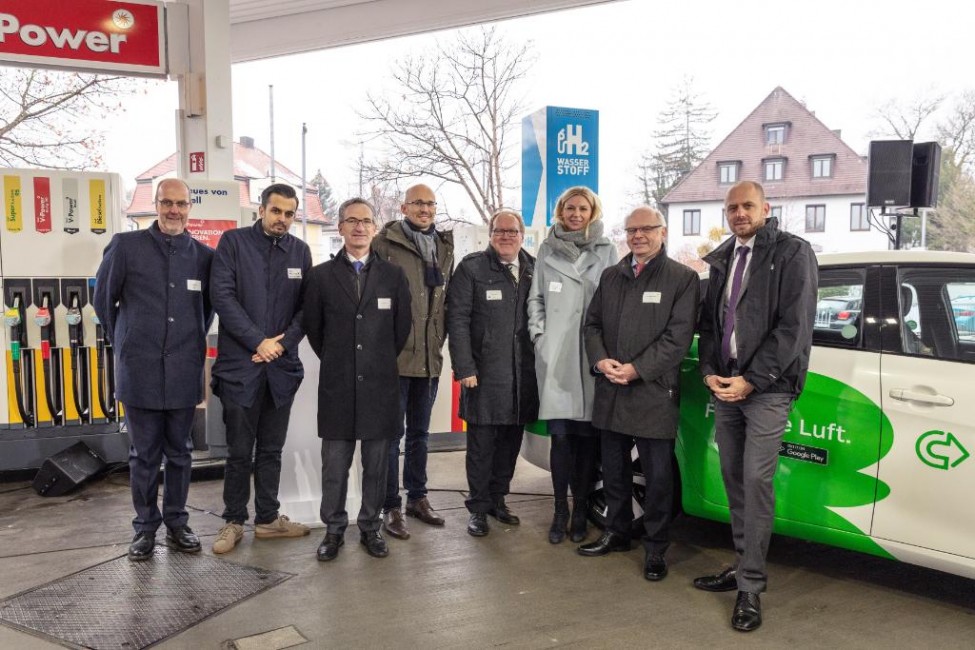
- Drivers of electric cars with fuel cells can refuel at more and more filling stations: Linde and Shell have today opened the third hydrogen (short H 2 ) station in the city of Munich – around 300,000 inhabitants live within reach. It is the seventh in Bavaria.
 Munich Nov 22 2018–The Shell petrol station Verdistraße is located near the interchange München West, one kilometer from the driveway to the A8. The station is one of the first petrol stations to be set up nationwide as part of the Clean Energy Partnership and with funding from the Federal Ministry of Transport and Digital Infrastructure (BMVI). The H 2 station in Verdistraße was funded by the National Innovation Program Hydrogen and Fuel Cell Technology (NIP). The owner of the new H 2 station at the Shell filling station is Linde. The hydrogen plant is operated by the joint venture H 2 MOBILITY Deutschland.
Munich Nov 22 2018–The Shell petrol station Verdistraße is located near the interchange München West, one kilometer from the driveway to the A8. The station is one of the first petrol stations to be set up nationwide as part of the Clean Energy Partnership and with funding from the Federal Ministry of Transport and Digital Infrastructure (BMVI). The H 2 station in Verdistraße was funded by the National Innovation Program Hydrogen and Fuel Cell Technology (NIP). The owner of the new H 2 station at the Shell filling station is Linde. The hydrogen plant is operated by the joint venture H 2 MOBILITY Deutschland.
Linde uses a new generation of the self-developed cryopump in filling station technology, which converts the liquid stored hydrogen into a gaseous state compressed to 900 bar. The advanced technology is also exported to the USA, Japan and China. Up to 200 cars can be refueled daily. The capacity of the liquid tanks can be extended from the current 400 kg to 800 kg if required.
The hydrogen station is state of the art. Their operation by the driver is intuitive; Refueling is similar to conventional vehicles and will be completed in three to five minutes.
E-mobility with hydrogen reduces CO 2 emissions
Hydrogen offers the opportunity to increase the availability of fuel in the transport sector in a climate-friendly way, because using hydrogen produced from renewable energy can significantly reduce climate-damaging CO 2 emissions. The operation of an H 2 -driven fuel cell vehicle causes neither local pollutants nor carbon dioxide (CO 2 ) emissions. The range of these vehicles is 500 to 800 kilometers per tank.
For electromobility to become a success story with hydrogen, it requires an attractive range of fuel cell vehicles as well as a corresponding supply infrastructure. The expansion of the corresponding filling station network is progressing well. There are currently 53 H 2 gas stations in Germany; By the end of 2019, there will be 100 stations nationwide.
The basis for the expansion of the hydrogen infrastructure in Germany has been laid by the Clean Energy Partnership (CEP) demonstration project, which sets common standards.
At the opening of the H 2 station Munich-Verdistraße the participants commented:
Thomas Zengerly, Chief Executive Officer Shell Deutschland Oil GmbH: “Hydrogen technology is a promising technology and H 2 a fuel for clean mobility. We assume that this alternative drive from the twenties in markets such as Germany, England, Benelux, the United States and Japan plays an increasingly important role. We at Shell are on track. “
Dr. Christian Bruch, Member of the Executive Board of Linde AG: “Hydrogen technology plays a crucial role in the successful spread of electromobility. Long range, short refueling time and good on-site storage capacity are key criteria for increasing the use of hydrogen. Linde technologies are used at all key points of the H 2 value chain and ensure high efficiency. “
Nikolas Iwan, Managing Director H 2 MOBILITY Deutschland GmbH: “Germany is on the way to becoming a pioneer in electromobility with hydrogen. We are currently building the backbone of the hydrogen infrastructure with the first 100 stations in metropolitan areas and along highways and highways. In terms of expansion, we are following the demand. “
Thomas Bystry, Shell Project Leader and Chairman of the Clean Energy Partnership: “Hydrogen has the potential to make a major contribution to the energy transition as a fuel and storage medium. The Clean Energy partners are committed to promoting the market for hydrogen mobility and making the most of synergies. “
Stephanie Jacobs, Environmental and Health Officer of the City of Munich: “We all need clean air to breathe and an intact environment. Especially in growing cities, individual traffic should be converted to emission-free or low-emission vehicles as quickly as possible. For this reason, the City of Munich is promoting the conversion of the Munich taxi fleet to e-taxis and fuel cell vehicles. With the opening of the hydrogen refueling station, you are making an important contribution to infrastructure expansion, which is currently too slow for fuel cell vehicles, and will continue to make Munich a liveable and lovable one. “
Read the most up to date Fuel Cell and Hydrogen Industry news at FuelCellsWorks




